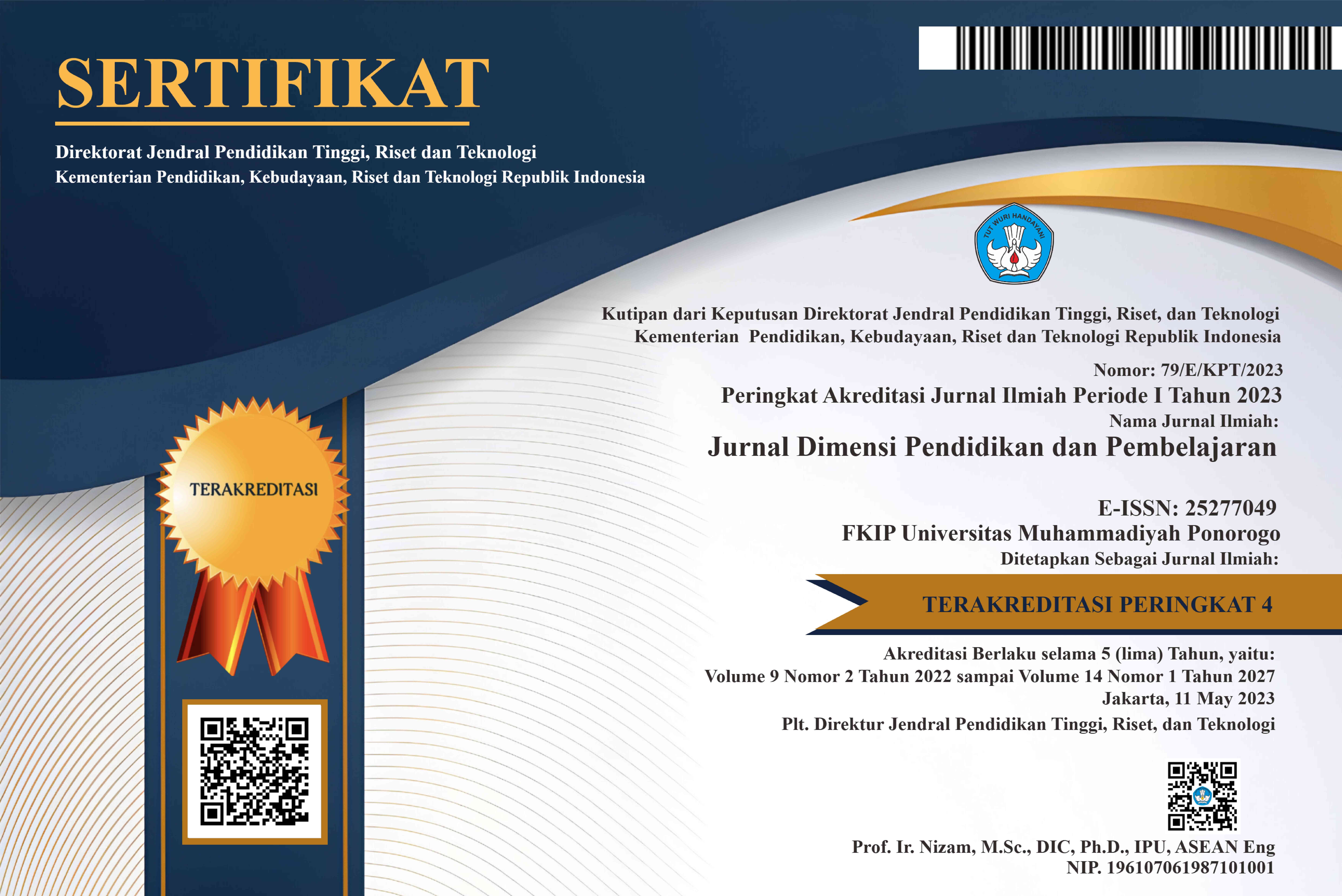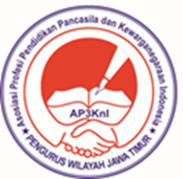Macro Approach in Education Strategic Planning: Implications For Sustainable Development at Sman 1 Kawali
DOI:
https://doi.org/10.24269/dpp.v13iSI1.11412Abstract Applying the macro approach in education strategic planning at SMAN 1 Kawali aims to support sustainable development by integrating sustainability principles into the curriculum. Education has a strategic role in raising students' awareness and engagement with environmental issues, as well as strengthening collaboration with external stakeholders such as parents and communities. This research used a descriptive qualitative approach with interview, observation, and documentation study methods. Data were collected from the principal, teachers, and students at SMAN 1 Kawali to explore the implementation of the macro approach and its impact on student engagement in sustainable education. Data analysis was done thematically to identify patterns and relationships in the implementation of school programmes. The results show that the macro approach in education strategic planning positively impacts student engagement. Integrating sustainability principles in the curriculum increases students' awareness of environmental issues and encourages them to actively participate in learning. In addition, collaboration between the school and external stakeholders has created a sense of ownership and responsibility for the environment. The project-based learning approach proved effective in improving students' motivation and academic achievement. The implementation of the macro approach at SMAN 1 Kawali contributes to increased student engagement and effectiveness of sustainable education. However, challenges in measuring long-term impact as well as limitations in the scope of the study need to be addressed. Further research is needed to explore similar implementations in other schools and develop more relevant evaluation indicators to support education sustainability.
References
Adiyanti, A., & Afandi, M. N. (2023). Model Perencanaan Strategi Dalam Meningkatkan Mutu Pendidikan Sekolah Dasar di Pemerintahan Daerah. Konferensi Nasional Ilmu Administrasi 7.0, 7(1), 16–22.
Ahmad, N. (2023). CoDesignS Education for Sustainable Development: A Framework for Embedding Education for Sustainable Development in Curriculum Design. Sustainability, 15(23), 16460. https://doi.org/10.3390/su152316460
Aprilia, I. D., Permana, J., & Syarifah, L. S. (2019). Analisis Kebutuhan Pelatihan Kewirausahaan: Sebuah Upaya Pengembangan Kemandirian Ekonomi bagi Penyandang Disabilitas. Jurnal Penelitian Pendidikan, 19(3), 356–365.
Ashshiddiqi, M. H., Mayesti, N., Irawati, I., & Rahmi, R. (2024). Pemanfaatan AI dalam Era Kurikulum Merdeka: Perspektif Siswa dan Guru Sekolah Menengah. Jurnal Dimensi Pendidikan dan Pembelajaran, 12(1), 267–278.
Cazorla-Montero, A., RÃos-Carmenado, I. d. l., & Pasten, J. I. (2019). Sustainable Development Planning: Master’s Based on a Project-Based Learning Approach. Sustainability, 11(22), 6384. https://doi.org/10.3390/su11226384
Dhuka, M. N. (2022). Perencanaan Strategis Mutu Pendidikan Agama Islam. Journal of Industrial Engineering & Management Research, 3(5), 287–298.
Fadhli, M. (2016). Pengembangan media pembelajaran berbasis video kelas iv sekolah dasar. Jurnal dimensi pendidikan dan pembelajaran, 3(1), 24–33.
Fane, A., & Sugito, S. (2019). Pengaruh Keterlibatan Orang Tua, Perilaku Guru, Dan Motivasi Belajar Terhadap Prestasi Belajar Matematika Siswa. Jurnal Riset Pendidikan Matematika, 6(1), 53–61. https://doi.org/10.21831/jrpm.v6i1.15246
Filho, W. L., Skanavis, C., Kounani, A., Brandli, L. L., Shiel, C., Paço, A. d., Pace, P. J., Mifsud, M. C., Beynaghi, A., Price, E., Salvia, A. L., Will, M., & Shula, K. (2019). The Role of Planning in Implementing Sustainable Development in a Higher Education Context. Journal of Cleaner Production, 235, 678–687. https://doi.org/10.1016/j.jclepro.2019.06.322
Gómez, M. del M. O., Suárez, M. L., Ferrara, C., & Cuevas-Rincón, J. M. (2020). Analysis of Psychometric Properties of the Quality and Satisfaction Questionnaire Focused on Sustainability in Higher Education. Sustainability, 12(19), 8264. https://doi.org/10.3390/su12198264
Hidayati, K. (2021). Behavior of Educational Organizations in Education for Sustainable Development. International Journal of Current Science Research and Review, 04(08). https://doi.org/10.47191/ijcsrr/v4-i8-02
Kessler, F., Frankenstein, J., & Rothkopf, C. A. (2022). A Dynamic Bayesian Actor Model Explains Endpoint Variability in Homing Tasks. https://doi.org/10.1101/2022.11.09.515854
Khasanah, V. A., & Muthali’in, A. (2023). Penguatan dimensi bernalar kritis melalui kegiatan proyek dalam kurikulum merdeka. Jurnal Dimensi Pendidikan dan Pembelajaran, 11(2), 172–180.
Khusniyah, T. W. K. (2023). Keterlibatan Orang Tua Dan Kerjasama Sekolah Dalam Pendidikan Siswa Sekolah Dasar: Studi Kepustakaan. Progres Pendidikan, 4(3), 193–199. https://doi.org/10.29303/prospek.v4i3.447
Kioupi, V., & Voulvoulis, N. (2019). Education for Sustainable Development: A Systemic Framework for Connecting the SDGs to Educational Outcomes. Sustainability, 11(21), 6104. https://doi.org/10.3390/su11216104
Masnah, S. L., Komaro, M., & Sumardi, K. (2024). Kompetensi Digital Guru SMK Menghadapi Tantangan Pembelajaran Digital. Jurnal Dimensi Pendidikan dan Pembelajaran, 12(2), 202–214.
Masri, Hadiyanto, & Yahya. (2023). Strategi Perencanaan Pendidikan Dan Implementasinya Di Sekolah Dasar. Journal Pusat Studi Pendidikan Rakyat, 3(2, Mei), 1–7.
Mesiono, M., Azmi, F., Putra, M. I., Rafiqah, S. R., & Faisal, F. (2022). The Preparation of Strategic Plans for Elementary School Students of Islamic Educational Institutions. Jurnal Basicedu, 6(6), 9555–9564. https://doi.org/10.31004/basicedu.v6i6.4092
Natalia, P. R., Padmadewi, N. N., & Utami, I. G. A. L. P. (2024). English Teachers’ Perspective on Feedback in Merdeka Curriculum. Jurnal Dimensi Pendidikan dan Pembelajaran, 12(1), 138–147.
Nikolić, V., Vukić, T., Maletaski, T., & Andevski, M. (2020). Students’ Attitudes Towards Sustainable Development in Serbia. International Journal of Sustainability in Higher Education. https://doi.org/10.1108/ijshe-11-2019-0336
Nurcholiq, M. (2023). PERENCANAAN STRATEGIS LEMBAGA PENDIDIKAN (Studi Kasus Pembelajaran Mandiri Integratif di Pondok Pesantren Mahasiswa Al-Hikam Malang). Leadership:Jurnal Mahasiswa Manajemen Pendidikan Islam, 4(2), 196–211. https://doi.org/10.32478/leadership.v4i2.1798
Ponce-Lopez, R., Peraza-Mues, G., Gómez-ZaldÃvar, F., Membrillo-Hernández, J., Acuña-López, A., & Caratozzolo, P. (2023). Knowledge based urban development: An approach to innovation districts based on education. Frontiers in Education, 8, 1029234.
Pratiwi, N. K. S. P. (2019). Pentingnya Peran Orang Tua Dalam Pendidikan Karakter Anak Usia Sekolah Dasar. Adi Widya Jurnal Pendidikan Dasar, 3(1), 83. https://doi.org/10.25078/aw.v3i1.908
Pristiwanti, D., Badariah, B., Hidayat, S., & Dewi, R. S. (2023). Penerapan Model Pembelajaran Discovery Learning Untuk Meningkatkan Hasil Belajar Siswa Sma Negeri 10 Kota Ternate Kelas X Pada Materi Pencemaran Lingkungan. Jurnal Bioedukasi, 6(2), 337–347. https://doi.org/10.33387/bioedu.v6i2.7305
Rochaeni, A., & Somantri, B. (2023). Pengaruh Perencanaan Dan Koordinasi Terhadap Evektivitas Penyusunan Rencana Kerja Pembangunan Daerah (Studi Kasus Di Badan Perencanaan dan Pembangunan Daerah Kabupaten Bandung). Jurnal Ilmiah Magister Ilmu Administrasi, 10(1).
Stasielowicz, L. (2022). Focus on Opportunities and Adaptive Performance: The Importance of Distinguishing Between Subjective and Objective Performance Measures. https://doi.org/10.31234/osf.io/ph7rq
Tresnowati, D., & Sunarto, S. (2022). Pengaruh Kemandirian Belajar Dan Motivasi Berprestasi Terhadap Keterlibatan Siswa Dimoderasi Dukungan Orang Tua. Research and Development Journal of Education, 8(2), 480. https://doi.org/10.30998/rdje.v8i2.12970
Winata, C., Anisha, D., Shaputra, D. A., Putri Lubis, L. F., Bintang, N. D., & Ningsih, S. R. (2022). Strategi Perencanaan Pendidikan di Era Globalisasi. Jurnal Pendidikan dan Konseling (JPDK), 4(5), 4523–4529.
Zhang, X., & Bartlett, J. C. (2021). What Does the Literature Tell Us? Reviewing Literature Reviews on Information Behavior. Proceedings of the Association for Information Science and Technology, 58(1), 872–874. https://doi.org/10.1002/pra2.593
Ahmad, N. (2023). CoDesignS Education for Sustainable Development: A Framework for Embedding Education for Sustainable Development in Curriculum Design. Sustainability, 15(23), 16460. https://doi.org/10.3390/su152316460
Aprilia, I. D., Permana, J., & Syarifah, L. S. (2019). Analisis Kebutuhan Pelatihan Kewirausahaan: Sebuah Upaya Pengembangan Kemandirian Ekonomi bagi Penyandang Disabilitas. Jurnal Penelitian Pendidikan, 19(3), 356–365.
Ashshiddiqi, M. H., Mayesti, N., Irawati, I., & Rahmi, R. (2024). Pemanfaatan AI dalam Era Kurikulum Merdeka: Perspektif Siswa dan Guru Sekolah Menengah. Jurnal Dimensi Pendidikan dan Pembelajaran, 12(1), 267–278.
Cazorla-Montero, A., RÃos-Carmenado, I. d. l., & Pasten, J. I. (2019). Sustainable Development Planning: Master’s Based on a Project-Based Learning Approach. Sustainability, 11(22), 6384. https://doi.org/10.3390/su11226384
Dhuka, M. N. (2022). Perencanaan Strategis Mutu Pendidikan Agama Islam. Journal of Industrial Engineering & Management Research, 3(5), 287–298.
Fadhli, M. (2016). Pengembangan media pembelajaran berbasis video kelas iv sekolah dasar. Jurnal dimensi pendidikan dan pembelajaran, 3(1), 24–33.
Fane, A., & Sugito, S. (2019). Pengaruh Keterlibatan Orang Tua, Perilaku Guru, Dan Motivasi Belajar Terhadap Prestasi Belajar Matematika Siswa. Jurnal Riset Pendidikan Matematika, 6(1), 53–61. https://doi.org/10.21831/jrpm.v6i1.15246
Filho, W. L., Skanavis, C., Kounani, A., Brandli, L. L., Shiel, C., Paço, A. d., Pace, P. J., Mifsud, M. C., Beynaghi, A., Price, E., Salvia, A. L., Will, M., & Shula, K. (2019). The Role of Planning in Implementing Sustainable Development in a Higher Education Context. Journal of Cleaner Production, 235, 678–687. https://doi.org/10.1016/j.jclepro.2019.06.322
Gómez, M. del M. O., Suárez, M. L., Ferrara, C., & Cuevas-Rincón, J. M. (2020). Analysis of Psychometric Properties of the Quality and Satisfaction Questionnaire Focused on Sustainability in Higher Education. Sustainability, 12(19), 8264. https://doi.org/10.3390/su12198264
Hidayati, K. (2021). Behavior of Educational Organizations in Education for Sustainable Development. International Journal of Current Science Research and Review, 04(08). https://doi.org/10.47191/ijcsrr/v4-i8-02
Kessler, F., Frankenstein, J., & Rothkopf, C. A. (2022). A Dynamic Bayesian Actor Model Explains Endpoint Variability in Homing Tasks. https://doi.org/10.1101/2022.11.09.515854
Khasanah, V. A., & Muthali’in, A. (2023). Penguatan dimensi bernalar kritis melalui kegiatan proyek dalam kurikulum merdeka. Jurnal Dimensi Pendidikan dan Pembelajaran, 11(2), 172–180.
Khusniyah, T. W. K. (2023). Keterlibatan Orang Tua Dan Kerjasama Sekolah Dalam Pendidikan Siswa Sekolah Dasar: Studi Kepustakaan. Progres Pendidikan, 4(3), 193–199. https://doi.org/10.29303/prospek.v4i3.447
Kioupi, V., & Voulvoulis, N. (2019). Education for Sustainable Development: A Systemic Framework for Connecting the SDGs to Educational Outcomes. Sustainability, 11(21), 6104. https://doi.org/10.3390/su11216104
Masnah, S. L., Komaro, M., & Sumardi, K. (2024). Kompetensi Digital Guru SMK Menghadapi Tantangan Pembelajaran Digital. Jurnal Dimensi Pendidikan dan Pembelajaran, 12(2), 202–214.
Masri, Hadiyanto, & Yahya. (2023). Strategi Perencanaan Pendidikan Dan Implementasinya Di Sekolah Dasar. Journal Pusat Studi Pendidikan Rakyat, 3(2, Mei), 1–7.
Mesiono, M., Azmi, F., Putra, M. I., Rafiqah, S. R., & Faisal, F. (2022). The Preparation of Strategic Plans for Elementary School Students of Islamic Educational Institutions. Jurnal Basicedu, 6(6), 9555–9564. https://doi.org/10.31004/basicedu.v6i6.4092
Natalia, P. R., Padmadewi, N. N., & Utami, I. G. A. L. P. (2024). English Teachers’ Perspective on Feedback in Merdeka Curriculum. Jurnal Dimensi Pendidikan dan Pembelajaran, 12(1), 138–147.
Nikolić, V., Vukić, T., Maletaski, T., & Andevski, M. (2020). Students’ Attitudes Towards Sustainable Development in Serbia. International Journal of Sustainability in Higher Education. https://doi.org/10.1108/ijshe-11-2019-0336
Nurcholiq, M. (2023). PERENCANAAN STRATEGIS LEMBAGA PENDIDIKAN (Studi Kasus Pembelajaran Mandiri Integratif di Pondok Pesantren Mahasiswa Al-Hikam Malang). Leadership:Jurnal Mahasiswa Manajemen Pendidikan Islam, 4(2), 196–211. https://doi.org/10.32478/leadership.v4i2.1798
Ponce-Lopez, R., Peraza-Mues, G., Gómez-ZaldÃvar, F., Membrillo-Hernández, J., Acuña-López, A., & Caratozzolo, P. (2023). Knowledge based urban development: An approach to innovation districts based on education. Frontiers in Education, 8, 1029234.
Pratiwi, N. K. S. P. (2019). Pentingnya Peran Orang Tua Dalam Pendidikan Karakter Anak Usia Sekolah Dasar. Adi Widya Jurnal Pendidikan Dasar, 3(1), 83. https://doi.org/10.25078/aw.v3i1.908
Pristiwanti, D., Badariah, B., Hidayat, S., & Dewi, R. S. (2023). Penerapan Model Pembelajaran Discovery Learning Untuk Meningkatkan Hasil Belajar Siswa Sma Negeri 10 Kota Ternate Kelas X Pada Materi Pencemaran Lingkungan. Jurnal Bioedukasi, 6(2), 337–347. https://doi.org/10.33387/bioedu.v6i2.7305
Rochaeni, A., & Somantri, B. (2023). Pengaruh Perencanaan Dan Koordinasi Terhadap Evektivitas Penyusunan Rencana Kerja Pembangunan Daerah (Studi Kasus Di Badan Perencanaan dan Pembangunan Daerah Kabupaten Bandung). Jurnal Ilmiah Magister Ilmu Administrasi, 10(1).
Stasielowicz, L. (2022). Focus on Opportunities and Adaptive Performance: The Importance of Distinguishing Between Subjective and Objective Performance Measures. https://doi.org/10.31234/osf.io/ph7rq
Tresnowati, D., & Sunarto, S. (2022). Pengaruh Kemandirian Belajar Dan Motivasi Berprestasi Terhadap Keterlibatan Siswa Dimoderasi Dukungan Orang Tua. Research and Development Journal of Education, 8(2), 480. https://doi.org/10.30998/rdje.v8i2.12970
Winata, C., Anisha, D., Shaputra, D. A., Putri Lubis, L. F., Bintang, N. D., & Ningsih, S. R. (2022). Strategi Perencanaan Pendidikan di Era Globalisasi. Jurnal Pendidikan dan Konseling (JPDK), 4(5), 4523–4529.
Zhang, X., & Bartlett, J. C. (2021). What Does the Literature Tell Us? Reviewing Literature Reviews on Information Behavior. Proceedings of the Association for Information Science and Technology, 58(1), 872–874. https://doi.org/10.1002/pra2.593
Downloads
Published
2025-02-07
Issue
Section
Artikel
License
Copyright
Authors who publish their manuscripts in this journal agree to the following terms:
- The copyright on each article belongs to the author.
- The author acknowledges that Jurnal Dimensi Pendidikan dan Pembelajaran has the right to be the first to publish under a Creative Commons Attribution 4.0 International (Attribution 4.0 International CC BY 4.0) license.
- Authors may submit articles separately, arranging for the non-exclusive distribution of manuscripts that have been published in this journal to other versions (e.g., sent to the author's institutional repository, publication into books, etc.), acknowledging that the manuscript was first published in the Jurnal Dimensi Pendidikan dan Pembelajaran.
Â
License
Use of the article will be governed by the Creative Commons Attribution license as currently published under the Creative Commons Attribution 4.0 International License (Attribution 4.0 International (CC BY 4.0).
Â
This license permits anyone to copy and redistribute this material in any form or format, compose, modify, and make derivatives of this material for any purpose, including commercial purposes, as long as they give credit to the author for the original work.


_001.jpg)



